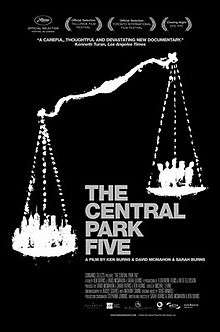The Central Park Five
| The Central Park Five | |
|---|---|
 Theatrical release poster | |
| Directed by |
Ken Burns Sarah Burns David McMahon |
Production company | |
| Distributed by | Sundance Selects |
Release date |
|
Running time | 119 min |
| Country | United States |
| Language | English |
The Central Park Five is a 2012 documentary film about the Central Park jogger case, directed by documentary filmmaker Ken Burns, his daughter Sarah Burns, and her husband David McMahon.[1] It was released in the US on November 23, 2012.
Content and background
The Central Park jogger case involved the violent assault, rape, and sodomy of Trisha Meili, a female jogger, in New York City's Central Park, on April 19, 1989. The attack left her in a coma for 12 days. Meili was a 28-year-old investment banker at the time, weighing under 100 pounds (45 kg). The New York Times described the attack as "one of the most widely publicized crimes of the 1980s."[2]
Sarah Burns, the daughter of documentary filmmaker Ken Burns, worked for a summer as a paralegal in the office of one of the lawyers handling a lawsuit on behalf of those convicted in the case.[1] The documentary was inspired by her undergraduate thesis, which was on the topic of racism in the media coverage of the event.[3]
The documentary provides background, interviews, expert analysis, and details of associated facts related to the case and the conviction of five suspects. It presents analysis to suggest that the police should have connected Matias Reyes, who eventually confessed to the crime, to the case at the time that it happened. DNA evidence identified him as the sole contributor of the semen found in and on the rape victim.
The five convicted juveniles sued New York City in 2003, nine years prior to the release of the documentary, for malicious prosecution, racial discrimination, and emotional distress. Ken Burns said he hoped the film would push the city to settle the case against it.[4] The city settled the case for $41 million in 2014, after Bill de Blasio became mayor. As of December 2014, the five men were pursuing an additional $52 million in damages from New York State in the New York Court of Claims.
Reception

Critic A. O. Scott of The New York Times said of the film, which he ranked as the fifth best documentary of 2012: "A notorious crime—the rape of a jogger in Central Park in 1989—is revisited in this painful, angry, scrupulously reported story of race, injustice and media frenzy."[5] Critic Manohla Dargis of The New York Times wrote: "residents ... identified several of the accused teenagers as belonging to a group of sometimes violent neighborhood troublemakers. ... Maybe the filmmakers thought that this history might muddy the waters and cast suspicion on the teenagers all over again. The problem is that by ignoring it—as well as gliding rather too fast over the gang attacks on the other people in Central Park on April 19—it seems as if there were something here that needs to be hidden."[6]
It received a Peabody Award in 2013 "for telling a harrowing, instructive story of fear, racism and mob mentality, and for exposing the media madness that fueled the investigation."[7]
As of March 2015, the film had a rating of 93% on Rotten Tomatoes, based on 69 reviews and an average score of 8.0/10, with a critic's consensus of "no consensus yet".[8]
References
- 1 2 "NYC is pressed to settle Central Park jogger case". USA Today. 6 April 2013. Retrieved 15 August 2015.
- ↑ "'Smart, Driven' Woman Overcomes Reluctance". The New York Times. July 17, 1990.
- ↑ "People were afraid to go into Central Park then, but it was still a kind of holy place. It offends people, the idea that you could be a victim of crime in Central Park, which is supposed to be the city’s backyard.". nydailynews.com. New York Daily News. April 9, 2013. Retrieved August 26, 2016.
- ↑ "City Subpoenas Film Outtakes as It Defends Suit by Men Cleared in ’89 Rape". The New York Times.
- ↑ Scott, A.O. (December 14, 2012). "25 Favorites From A Year When 10 Aren't Enough". The New York Times.
- ↑ Manohla Dargis (November 21, 2012). "Filmmakers Still Seek Lessons From a Case That Rocked a City; The Documentary ‘The Central Park Five’". The New York Times.
- ↑ 73rd Annual Peabody Awards, May 2014.
- ↑ "The Central Park Five Movie Reviews". Rotten Tomatoes. Retrieved April 16, 2013.
External links
- The Central Park Five on IMDb
- The Central Park Five at Rotten Tomatoes
- Central Park Five | PBS Official Page